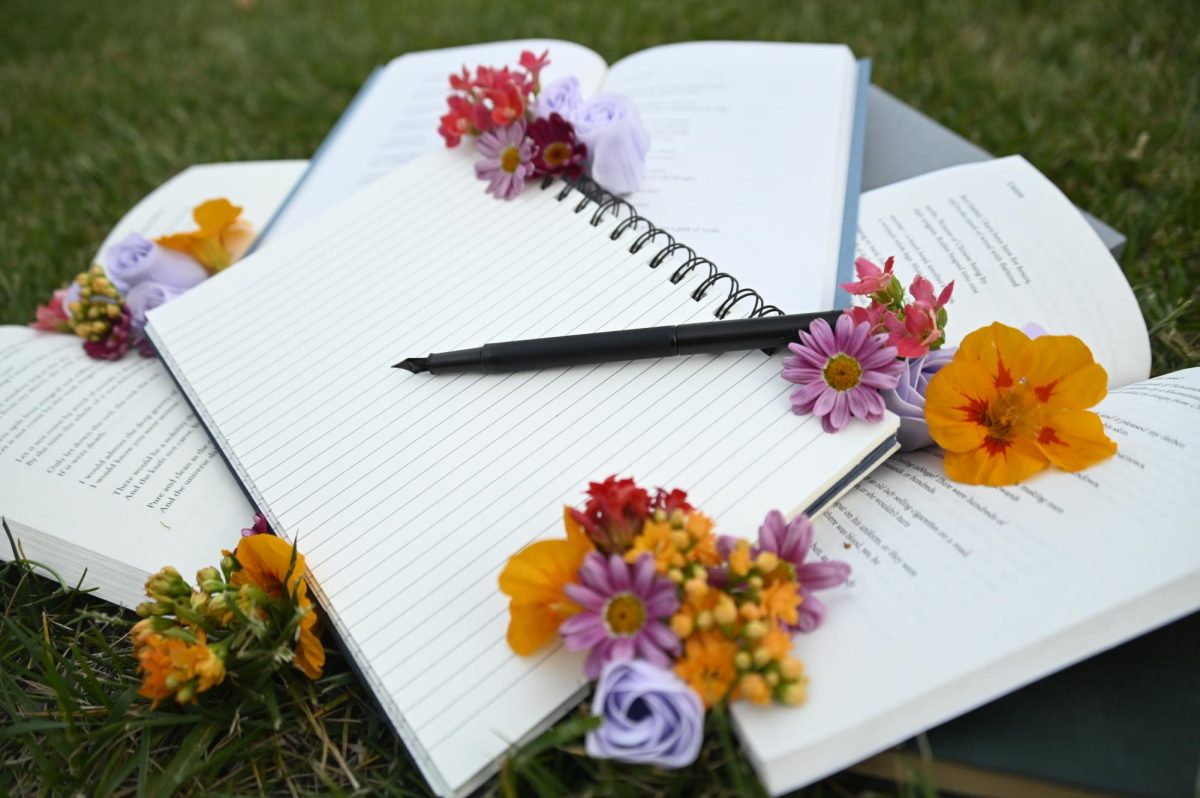Adolescence often feels like a struggle. In these turbulent years, teenagers may feel the need to express themselves, to make their voices heard. Poetry is one such mode of expression, allowing for a release of feelings and subsequent self-discovery. Many students turn to poetry to reflect on their emotions, whether for self-awareness or catharsis.
Sophomore Helen Gu started writing in elementary school when her teacher posted an advertisement for a poetry competition. Ever since, she entered more competitions and eventually fell in love with writing. This year, Helen applied for the Youth Poet Laureate program, aiming to spread social justice messages through the three poems she wrote as part of the application process.
“I chose the pieces that I liked the best at the moment and the ones which have the strongest message to them,” Helen said. “These poems are more about social issues and personal issues, which makes sense for the application because being a poet laureate is about bringing poetry to the outside world.”
Helen uses writing as a way to explore her own identity and to advocate for social issues that she cares about such as mental health and intersectionality. She feels a personal connection to the freedom of expression and form that comes with poetry.
“Poetry is just the art form that makes the most sense to me,” Helen said. “I understand it more than other writing styles. I like writing other things too, but I think poetry feels right to me. Every artist has a form of art that they gravitate to. For me, that’s poetry.”
Junior Iris Cai followed a different path to beginning to write. Her interest in poetry first piqued towards the end of middle school when working on a school assignment. After attending a writing camp in sophomore year, she began to seriously explore poetry.
“I started writing because I liked to read a lot as a kid, so writing is an extension of that,” Iris said. “It’s very concise and a lot of emotion packed into a short form, and that really speaks to me. When people look at the world, they don’t look at it the way you watch a movie. Certain impactful things stand out to you when you think of your memories, and I think poetry just really captures that. It’s a way of helping me process and also a way of putting out something that will provide some sort of message.”
Unlike Helen and Iris, junior Eric Zhang pursues poetry mostly through reading and recitation. Wanting to break out of his shell, he participated in the Poetry Out Loud contest in 2023. Alongside recitation, he dabbles in writing as well.
“With poetry, it doesn’t always have to be exact or concrete,” Eric said. “You don’t have to necessarily follow all the grammar conventions. You can just use words and use the feelings of those words to create a painting. It doesn’t have to have a pure meaning like with a book.”
While poetry may be cathartic, beginning the writing process can be difficult and stressful. Helen often struggles to find inspiration, sometimes going months between writing poems. In the meantime, she writes down phrases to keep in mind when she feels inspired again.
“Most of the time, I start with a phrase,” Helen said. “When I think about a certain topic I want to write about, there’s a certain phrase that sounds right to me in my head. Usually, it’s a phrase with a specific message or rhythm. So I write that down, and I can work my way up from there. Sometimes what’s easiest for me is starting from the end of a poem because I’m better at writing endings.”
Like Helen, Iris often forms her poems from trigger phrases. To combat writer’s block, she recommends taking inspiration from other works and immersing oneself in the surrounding world.
“Reading is good because you can see how other people are describing certain things and that might give you inspiration,” Iris said. “But you don’t want to accidentally imitate them too much. I think it’s also good to go put yourself out there and talk to people about their experiences and let yourself experience the world around you.”
With poetry, students can grow to recognize the beauty in other perspectives and also find the beauty in themselves. The freedom that comes with writing a poem allows students to dive into the depths of their identity. English teacher Jennifer Siraganian encourages students to recognize the worth of their story and start writing.
“You have a voice,” Siraganian said. “You have a story, and that’s important. That deserves to be seen and recorded. Just believe that there is value in what you have to say. Keep writing even if there are voices in your head that say ‘I’m not good enough’ or ‘this person is better than me’ or ‘this will never get published’.”


















![“[Building nerf blasters] became this outlet of creativity for me that hasn't been matched by anything else. The process [of] making a build complete to your desire is such a painstakingly difficult process, but I've had to learn from [the skills needed from] soldering to proper painting. There's so many different options for everything, if you think about it, it exists. The best part is [that] if it doesn't exist, you can build it yourself," Ishaan Parate said.](https://harkeraquila.com/wp-content/uploads/2022/08/DSC_8149-900x604.jpg)




![“When I came into high school, I was ready to be a follower. But DECA was a game changer for me. It helped me overcome my fear of public speaking, and it's played such a major role in who I've become today. To be able to successfully lead a chapter of 150 students, an officer team and be one of the upperclassmen I once really admired is something I'm [really] proud of,” Anvitha Tummala ('21) said.](https://harkeraquila.com/wp-content/uploads/2021/07/Screen-Shot-2021-07-25-at-9.50.05-AM-900x594.png)







![“I think getting up in the morning and having a sense of purpose [is exciting]. I think without a certain amount of drive, life is kind of obsolete and mundane, and I think having that every single day is what makes each day unique and kind of makes life exciting,” Neymika Jain (12) said.](https://harkeraquila.com/wp-content/uploads/2017/06/Screen-Shot-2017-06-03-at-4.54.16-PM.png)








![“My slogan is ‘slow feet, don’t eat, and I’m hungry.’ You need to run fast to get where you are–you aren't going to get those championships if you aren't fast,” Angel Cervantes (12) said. “I want to do well in school on my tests and in track and win championships for my team. I live by that, [and] I can do that anywhere: in the classroom or on the field.”](https://harkeraquila.com/wp-content/uploads/2018/06/DSC5146-900x601.jpg)
![“[Volleyball has] taught me how to fall correctly, and another thing it taught is that you don’t have to be the best at something to be good at it. If you just hit the ball in a smart way, then it still scores points and you’re good at it. You could be a background player and still make a much bigger impact on the team than you would think,” Anya Gert (’20) said.](https://harkeraquila.com/wp-content/uploads/2020/06/AnnaGert_JinTuan_HoHPhotoEdited-600x900.jpeg)

![“I'm not nearly there yet, but [my confidence has] definitely been getting better since I was pretty shy and timid coming into Harker my freshman year. I know that there's a lot of people that are really confident in what they do, and I really admire them. Everyone's so driven and that has really pushed me to kind of try to find my own place in high school and be more confident,” Alyssa Huang (’20) said.](https://harkeraquila.com/wp-content/uploads/2020/06/AlyssaHuang_EmilyChen_HoHPhoto-900x749.jpeg)






